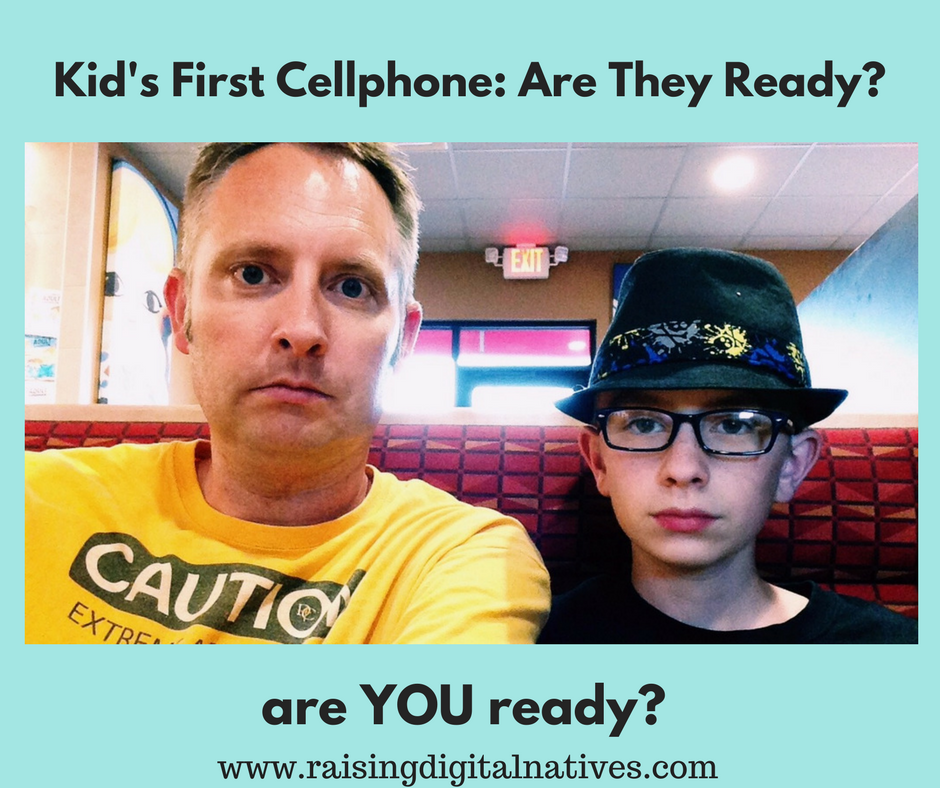“Is my child ready for a cell phone?” “Am I ready to parent a kid with a phone?” “How can I be prepared for everything that can happen once my child gets his first cell phone?” Getting a phone – or any connected device – for your child is a huge turning point. It can be hard to know when the time is right, and most importantly, how to prepare for it.
With a smartphone, your child will have complete access to the Internet and the ability be in contact with almost anyone on the planet – from anywhere. In other words, all this can potentially happen out from under your watchful eye. Mentorship is crucial. Teaching your child to make good decisions and to know when to get help is sets them up for a lifetime of successful digital communication.
Your Kid’s First Cell Phone: Is This Really the Right Time?
If you are feeling pressure from your child, or other parents to buy him/her a phone, remember – this is a big deal and it is still your decision. You might feel particularly intense pressure to buy your child a device around milestones such as birthdays or holidays. Maybe you can simply decide that a cell phone or smartphone isn’t a good holiday or birthday purchase. Decoupling the phone purchase from these milestones takes the pressure off of you, and lets you focus on the transition to greater communication independence separate from all the other planning and social expectation that that come with holidays.
Instead of a date on the calendar, consider independence milestones, ways for your child to demonstrate that she’s ready. Does she make her own lunch? Walk home from school on her own? Spend a short time home alone? Can he babysit a younger child for short windows of time or take public transit by himself? Is he responsible with his allowance or other money/savings? Is she organized with her homework, or putting away her own clothing? If so, maybe your answer will be, “yes, she is ready.” Maybe you can even set progressive milestones so that your child has to work towards the responsibility and demonstrate readiness.
Another indicator that your child might be ready (or not) for a phone is his social decision-making ability. Is your child impulsive? Quick to feel angry or excluded? Good at apologizing if she has made someone feel bad? How good is he at not using tech as a distraction from other activities he needs to focus on? If your child has not yet had the opportunity to demonstrate some of these life and social skills, you may want to hold off on a personal device.
Give your child a chance to learn, let him practice making plans via text message on a family or shared device, and let him know which skills are most important to demonstrate… before you buy him that phone.
Would it be helpful if someone could help you figure out the most crucial considerations for parenting a new phone communicator? You can join my self-paced Online Phonewise Boot Camp for parents (currently on sale til July 10 for July 4th week!)
Start with Your Own Fears
It’s important to examine your own feelings and reactions. What exactly are your fears about getting your child a cell phone? Conversely, what are your concerns about not getting your child a cell phone? Are you worried that she will be the only one without one in her social group? That she might be ostracized? That you will be that parent who wouldn’t let her kid get a cell phone? Or is it simply that she won’t be able to communicate with you throughout the day?
Here are a few key issues for you to consider and to address with your child:
- Social Issues. Parents worry that their kids will become screen-addicted and withdraw from family contact. Or that they will lose lose face-to-face social skills when they rely on devices for their communication. Or that they will tempted to “overshare” to gain social standing.
- Concerning Content. Pornography and other inappropriate content will be more accessible on a smartphone. Can my child resist the pull? Beyond that, parents worry that there’s more potential contact with strangers through smartphone apps, chat, and online. Will your child make sound, healthy decisions?
- Images. Every smartphone comes with a camera built-in now. Taking and sharing photos is a big responsibility. Is your child ready?
- Privacy: And what about the information/data trail that your child is leaving? All posts and interactions build up a “digital footprint.” Does your child understand the larger issues of digital identity?
Getting Ready: Cell Phone Training Wheels
Teach them some basic phone etiquette.
Before they get their own phone, make sure they know how to answer a phone, make a call, and leave a message politely. You would do this with a “regular” phone too, and a cell phone is no different. Model good boundaries for texting, too. Remind kids: Just because you send a text message doesn’t mean that the recipient is immediately available, or can drop everything to respond!
Develop boundaries, and share them with peers.
Work with your child to set some boundaries on when to text (time of day, not during school, etc.) and then how to let peers know their boundaries. For example, letting friends know, “I don’t group text,” or “I can’t respond to texts after 9 pm.” is helpful. Sharing these boundaries reduces their connectivity anxiety.
Start small, and give them some initial guidance.
Texting and social media open up a whole additional set of challenges and competencies. For kids getting phones before the minimum recommended age for many social apps, let them start experimenting with texting and group texting, under some light supervision. Once you see them successfully navigating these waters, then they may be ready to add a social app but that is a decision you want to make with care.
Open the Discussion: Get Curious!
Texting, in particular, is an important part of kids’ social sphere, and they need to learn the conventions and expectations. In my experience working with kids, they are often eager to have a space to discuss the challenges that texting can bring. Here are some questions to ask your child about texting.
- What is fun—and not fun—about group texting?
- Have any of your friends ever texted too much or too many times?
- What should you do if you text someone and he doesn’t text back right away?
- Have any of your friends ever showed your texts to someone else?
Try to be calm and nonreactive, and let your child describe his experiences with communicating with friends. As much as possible, refrain from quick judgement. This is an opportunity to teach them good life skills in general. Owning up to your errors, apologizing sincerely, and re-stablishing the bond with a friend is the best way to move past many issues. And of course, learning how to avoid such a misstep in the future.
Your own experiences with navigating relationships can be so helpful to your child. Remember that you have wisdom…and try not to panic when things go wrong in your child’s digital world. Some challenges are inevitable and learning to deal with them is part of growing up in the digital age.
Help Me Get Ready For My Child’s First Cell Phone
When you put all these together, it’s easy to see why this is such a source of stress for families. Do you wish there was a course on this? After years of research and talking with families, I’ve created a Phonewise Bootcamp for Parents to help parents get ready for this milestone. This online class is self-paced, and chock full of videos, interactive exercises and more. The class is perfect for parents who are considering getting their child a phone soon, or are in the first year with a phone and want to decrease conflicts and improve family communication about the phone.
Want to know more about this course? You can see a preview here.
(Click the link below for more information or to register for course.)
This course will cover:
- Assessing your family’s current digital situation
- Planning and organizing your physical space at home to maximize positive outcomes
- Common digital citizenship challenges for new smartphone users
- What social skills kids need to be successful with their phones and more.
- Planning for boundaries around when your child will have access to the device
Devorah Heitner is the author of Screenwise: Helping Kids Thrive (and Survive) in Their Digital World and the founder of Raising Digital Natives.
—
Photo credit: “Day 181: Serious” by David Mulder is licensed under CC BY 2.0. Changed from original: Added text overlays.
Hit the reset button on your family’s digital life!
Sign up below for 7 days of actionable strategies, right in your inbox.

